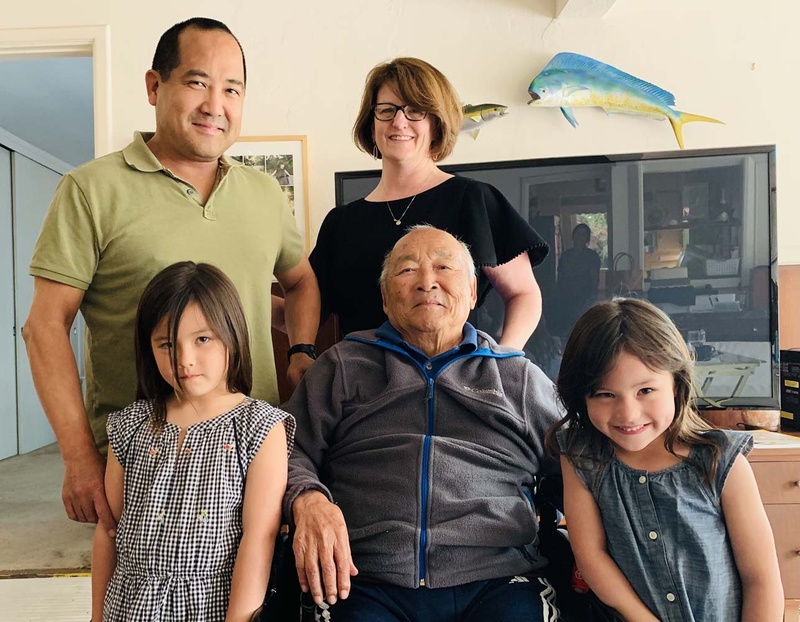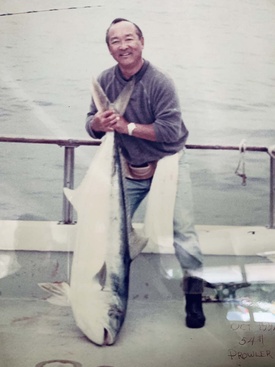Now, jumping ahead to when the redress happened and the Civil Liberties Act was passed. What do you remember about receiving the apology or what was your reaction to getting the letter and then the redress?
I don't think I even read the letter.
You didn't read the letter?
I don't remember. I don't even remember receiving the money. I guess my parents probably put it in the bank for themselves. That was $20,000 per person that was interned.
Were your parents still alive?
Oh yeah.
So your parents got the apology.
[Mark]: Well your dad was not around in '91. Your dad was not around anymore and I remember your mom was around to get the money. I remember that. I vaguely remember that. But I think she passed away not long after that. But your dad had passed away from, was it a stroke?
[Holly]: No, he was in surgery.
[Leland]: Yeah, he had bypass surgery at Loma Linda Hospital and he never recovered from the anesthetic.
[Mark]: But that was well before '91 because I remember we were little kids then, I want to say maybe I was 10 or 11. And Brad was a few years older than me. Because I remember you said that he would have paid for Brad to go to college.
[Leland]: Oh, I don't remember.
Just kind of thinking about it now, what is your feeling about the fact that they did apologize and tried to correct — do you feel like that was enough?
Well, I don't think that's enough, especially for my dad. You know, he was a dentist, his practice was really building up nicely and to be taken away from all that for five years and say here's $20,000 to make up for your lack of income. There's no way you can replace that with $20,000.
What do you think would have happened with your family's livelihood if you if he had not been taken away? Do you feel like anything would have been drastically different?
Well, it would've been a lot easier for everybody. A lot easier.
Did they ever talk about going back to Japan?
My dad went back to Japan after the war. He says, "I wouldn't mind visiting, but I will never go back there live."
Do you know why he felt that way?
Yeah he told me why. He says he spent so much time over here that when he went to Japan — his family were farmers. And so he loved the country kind of life rather than the Tokyo type of life.
And he'd go into these restaurants and they could detect right away that he was not a native Japanese, that he was visiting from the United States because he spoke differently because he's been in this country since he was a kid. And so they bring a menu. And several years after the war, they had menus for the local people and they had menus for visitors. And that really pissed him off. He says, “I'm being cast and treated like a second class citizen.”
The native Japanese thought all Japanese that lived in the United States were traitors and that's why they had different menus. 'Cause my dad could read and write and speak and all that, you know. And it really pissed him off.
[Holly]: I just imagine it was such an interruption in your life. So even though his family sort of adopted the outlook of hey, let's just move on but I heard it actually in your voice [to Leland] this afternoon for the first time, I heard a little bit of the of “this was illegal, it was not right.” I think that's the strongest I've ever heard you speak about it.
Now to take a kind of different turn, I'm curious about how you met your wife and what that story is, and did she have a camp experience, too?
I don't know if she had a camp experience or not, I don't know that part. But my buddy got married and I was one of the ushers and my wife-to-be was one of the bridesmaids. And during rehearsal, that's when I met her. And I don't know why we started dating, but that's how I ended up, you know, meeting her.
And was this in Riverside?
No, she lived in Gardena.
How old were you when you met?
Late 20s.
Were you working or what were you doing?
I don't know what I was doing there. I had gone to college, I was going to become a dentist and I went to dental school for one semester, but I really didn't like the work. It was all close work and I could just feel my stomach just getting tighter, tighter because it was always close work.
And I remember toward the end of the semester, you know, you're doing lab work, doing homework. The thing that broke the camel's back was when they passed out a bar of little Ivory soap. “Okay, here's a piece of soap and I want you each to pick a tooth, carve it, and present it to our teacher.” And I looked at it, I said, I can't do, this is more detail work. And that's when I actually said, that's enough.
When that happened, I called the office and my mom was answering the phone and I told her, I can't do this. And she relayed the message to my dad and he said, “Tell him to come home because if he becomes a dentist, he's going to be a lousy dentist.”
Yeah, you better like your work.
Yeah. He didn't hesitate one bit.
Now, did your dad want you to pursue that or was it your idea to go into dental school?
No. It was not only his idea, all of his friends. I'd meet him when I was six, seven, eight years old? And they said, “Oh, you're going to be like your dad.” And that's the way it was all my young life.
It's a lot of pressure to live up to.
Well, yeah. It was assumed, they didn't ask what I wanted. When I was in junior high school I remember I told my mom, I said I really like draftsman, architecture and stuff like that. I loved it. I had a whole kit that had all different kind of pens and stuff like that.
My mom says, “No you got to be in business for yourself, you gotta be the boss.” ‘Cause my instructor told me, “You do really good work. If you want to continue this kind of education, I can guarantee you a job when you get out of high school.” But my mom says no, you gotta be your own boss, you can't be working for somebody else.
And you tried that and you didn't like dental school.
No I didn't like it at all.
What did you end up doing as a profession?
I was a stockbroker. Oh that's a completely different thing because after I dropped out of school, I didn't know what I wanted to do. I was just bouncing around and I met this one guy that had three offices, one in California and two out of state. And I told him, “I'm fascinated with these stocks and things like that.” And so he says, “Well, if you're interested, I'll teach you what I know and if you like it, pursue it. But there's no guarantees on this now.”
So, boy, there was several years it was really tough because you were working on commission and when you don't know anybody, it's really hard. You got to prospect all the time and you hear a lot of no, I'm not interested. “Go away.”
And you did that all in California. Were you living here?
Yeah, I did it for almost 20 years.
So you really enjoyed that that work?
For a while, then it got boring because what happened was that the country ran into runaway inflation, where you could buy government bonds that paid way more than corporate bonds and it was a lot safer.
So why should you take a risk? Why are you going to go out and buy a hundred shares of General Motors or General Electric or Chrysler or any of those big name companies, which carries a risk, when you could buy good substantial bonds that are guaranteed, save that remote possibility of them going bankrupt.
So to bring it back to your wife, what was your wife's name?
[Mark]: Margaret Osaka. She was younger, I think she was, maybe even nine or ten years younger than you.
[Leland]: Yeah, probably.
And then when did you get married? Do you remember the year you got married?
No I forgot. I just remember my mom telling me she really liked Margaret. So she said, “When are you going to get married?” I still remember the words: It's not nice to string her along — when are you gonna get married?
But I was always afraid of girls, you know, I had difficulty talking to them face to face. All my life really. Especially as I got older and in high school especially and it went all the way through college.
You must have just felt comfortable with her.
Yeah, I did. I did.
Now I'm assuming she passed?
She did. December in 1984.
[Holly]: So Dad really raised the two boys.
I'm curious what you would like your grandchildren or great-grandchildren to remember about your experience? What do you want them to remember about your life?
I really don't know ‘cause I don't remember that much about old history, my old history. So I really have nothing to reference my history. Just, things happen. But I let it slide off, I don't hold grudges or anything like that.
[Holly]: I think there was like one thing I would want them to take away, is their resilience. That would be something I'd want the girls to remember and know. And I think what Dad said was great advice about “don't hold grudges.” Or don't hang on to that.
[Leland]: Why dwell on it, you know? I think I forget little pieces along the way. So I remember feeling less as I get older. That's true. It kind of fades a little bit.
* This article was originally published in Tessaku on June 17, 2021.
© 2021 Emiko Tsuchida








